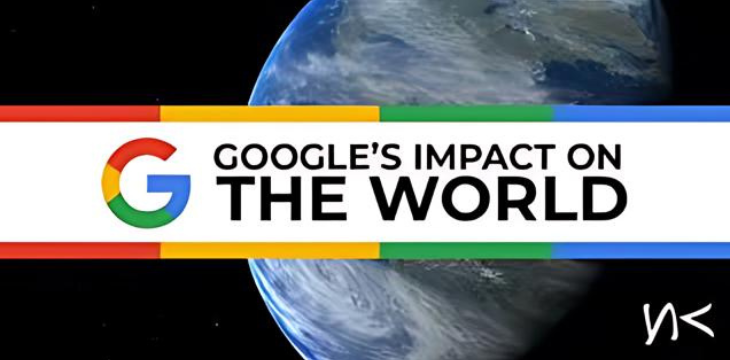Google. Just saying the name conjures up images of endless search results, quick answers to burning questions, and an almost magical ability to pull information from the ether. Whether you’re seeking the best taco joint in town or looking up how to fix a leaky faucet, Google has become an indispensable part of our daily lives. But have you ever paused to ponder how this tech titan came to be? How did it morph from a simple search engine into a global powerhouse? Buckle up, as we embark on a journey through the fascinating evolution of Google, exploring its transformative impact and the quirky details that make it a digital phenomenon.
The Birth of a Tech Giant
From Dorm Room to Global Domination
It all started in 1996. Two Stanford University students, Larry Page and Sergey Brin, were working on a research project that would soon become the heart and soul of the internet’s most beloved search engine. Their brainchild, initially dubbed “Backrub,” was designed to index and rank web pages in a way that was more efficient and relevant than anything that had come before.
- Original Concept: The PageRank algorithm, named after Larry Page, was the cornerstone of their search engine. It aimed to evaluate the importance of websites based on the number and quality of links.
- Evolution: By 1998, the name was changed to Google—a playful twist on the mathematical term “googol,” reflecting their mission to organize a vast amount of information.
The Leap from Startup to Search King

Google’s rise wasn’t an overnight phenomenon. The company’s big break came in 2000 when it introduced AdWords, its advertising program. This innovation allowed businesses to display ads alongside search results, transforming Google’s from a tech startup into a major player in the online advertising realm.
The Google Experience: More Than Just Search
A World of Services
You might think Google is all about searching the web, but oh, there’s so much more! Here’s a rundown of some of Google’s coolest services:
- Google Maps: Lost? Google Maps will not only guide you to your destination but also offer real-time traffic updates, satellite views, and even street-level imagery.
- Gmail: Launched in 2004, Gmail revolutionized email with its massive storage capacity and intuitive interface.
- Google Drive: Need to collaborate on a project? Google Drive allows seamless sharing and editing of documents, spreadsheets, and presentations.
- YouTube: Acquired by Google in 2006, YouTube has become the go-to platform for video content, from cat videos to in-depth tutorials.
- Google Photos: With unlimited cloud storage for photos and videos (at high quality), Google Photos is a lifesaver for anyone looking to keep their memories organized.
The Innovation Engine
Google’s not just about providing services; it’s also about innovation. Consider the Google’s X lab, where experiments like self-driving cars and Project Loon (internet balloons) come to life. The company’s mantra seems to be, “If it’s not breaking new ground, it’s not worth doing.”
Google and Its Impact on Society

Changing How We Learn
Remember when encyclopedias were the go-to source for information? Now, if you need to know anything, you just Google it. The sheer ease of access to information has changed how we learn and consume knowledge. Students, professionals, and curious minds alike rely on Google’s to provide instant answers and solutions.
Transforming Business Practices
Businesses have had to adapt to the digital age, and Google has played a crucial role in this shift. With tools like Google’s Analytics, companies can track website performance, understand user behavior, and optimize their marketing strategies. The introduction of Google’s My Business has allowed local businesses to enhance their online presence and attract customers more effectively.
The Evolution of Communication
With tools like Google Hangouts and Google Meet, communication has become more streamlined and accessible. These platforms have been especially vital in the rise of remote work, allowing teams to stay connected no matter where they are.
FAQs About Google

What is Google’s PageRank algorithm?
PageRank is an algorithm used by Google to rank web pages in search engine results. It measures the importance of web pages based on the number and quality of links to them.
How does Google make money?
Google primarily makes money through advertising. Its AdWords platform allows businesses to place ads alongside search results and on other websites, generating significant revenue for the company.
What is Google X?
Google X (now known as X) is a research and development lab focused on creating breakthrough technologies. Some of its notable projects include self-driving cars and the Google’s Glass wearable.
How does Google protect user privacy?
Google’s implements various security measures to protect user data, including encryption and two-factor authentication. However, it’s always wise for users to stay informed about privacy settings and manage their data accordingly.
The Future of Google: What Lies Ahead?
AI and Machine Learning
Google’s investments in artificial intelligence and machine learning promise to push the boundaries of technology even further. Google Assistant, for example, continues to evolve, offering increasingly sophisticated voice interactions and smart home integrations.
Quantum Computing
Another area of interest for Google’s is quantum computing. Though still in its early stages, this technology has the potential to solve complex problems that are currently beyond the reach of traditional computers.
Sustainability Initiatives
Google is also focusing on sustainability, aiming to operate entirely on renewable energy. The company’s commitment to reducing its carbon footprint reflects a broader trend in the tech industry toward environmental responsibility.
Conclusion
Google has transformed from a humble search engine into an all-encompassing digital ecosystem. Its journey from a Stanford dorm room to global dominance is a testament to the power of innovation and ambition. With its ever-expanding range of services and a commitment to pushing the boundaries of technology, Google’s isn’t just a part of our digital lives—it’s shaping them.
So next time you type a query into that little search bar, remember: you’re not just using a tool; you’re tapping into a global phenomenon that has changed the world in ways we’re only beginning to understand. Here’s to Google’s—may it continue to surprise, innovate, and enrich our lives in the years to come!

